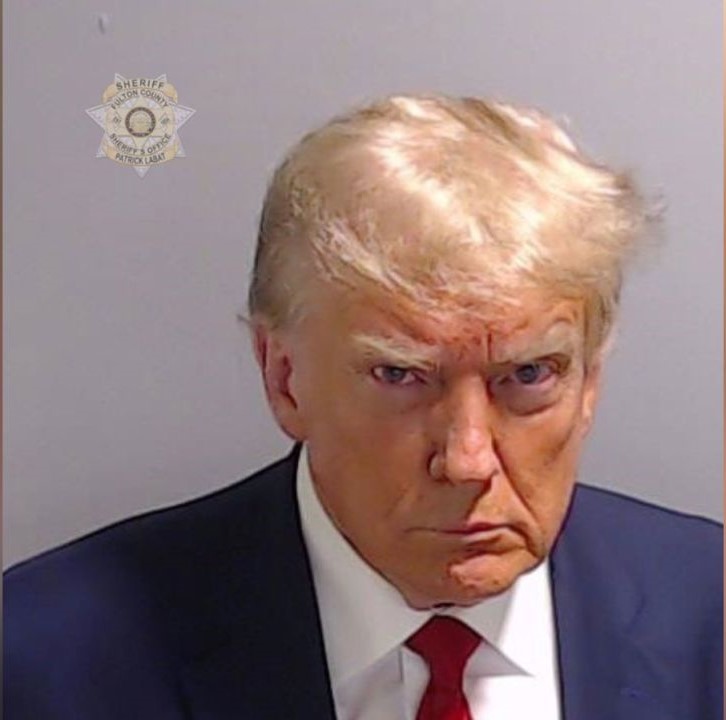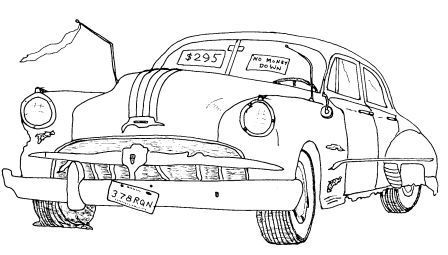

|
Let's Not Forget ...No. P01135809
NEW!Essays and opinions by Editor James M. Flammang may now be seen on Substack (angularviews.substack.com). Subscriptions are Free, and encouraged.Current essay topics include the 2024 Election ... Getting Noticed ... Mass Transit .. Greed ... AI ... EVs ... Fear ... Guaranteed Income ... Job Woes ... Juries ... Socialism ... Misfits ... Drunkenness ... Decrepit old cars ... and Competition.
COMMENTARYThinking About Leaving U.S.?What can democracy lovers do as vision of second Trump presidency looms ever closer?(Early October Update) Yes, the future (or demise) of democracy lies on the November ballot; and for about half of Americans, its prospects are mighty troubling.Four years ago, as the 2020 presidential election drew to a close, voters for both candidates (but especially for Biden) expressed fear for the future. This year, the stakes are far higher. As Donald Trump's first term developed, some of us began pondering possibilities that would have seemed ludicrous a few months previous. With the potential for political disaster looming in the 2022 Midterm election, searching for a way out seemed more compelling than ever. Subsequent events, as Republicans opened Congress with a slim House majority, added to the concern. By the time Donald J. Trump was indicted in New York, with nearly all Congressional Republicans taking his side, the country appeared more divided than ever. Now, less than a month before the election, having faced 91 felony charges in four courts and already convicted once, while repeatedly promising retribution against all opponents, Mr. Trump is in a virtual "dead heat" with Vice-President Kamala Harris. Especially with the nomination of JD Vance as his running mate, the near-certainty of unprecedented chaos looms ever larger, whether or not the Republican ticket achieves electoral victory.
What can we, as individuals on the liberal or progressive end of the political spectrum, do to survive?
• Intensify peaceful, last-minute protests. • Tune out: Strive to ignore the worsening political scene. • Weigh the merits and drawbacks of splitting the country into red and blue nations: a drastic and difficult action. Gunshots: Not Again ... and Again and Again!One week in April 2023 was a big one for gun-wielding homeowners. When a 16-year-old Black boy went to the wrong house in Kansas City to pick up his siblings and rang the bell, the 84-year-old white man inside answered with gunshots. Days later in upstate New York, a young woman passenger was shot and killed by a 65-year-old man, after her driver turned into the wrong driveway. On a Saturday night in Alabama, a Sweet Sixteen party for a 16-year-old girl ended with four killed and 32 injured. Late on a Tuesday, two teen cheerleaders were shot in a Texas supermarket parking lot when one of them tried to open a car door, mistakenly thinking it was her own vehicle.In Nashville in March 2023, a shooter fired 152 shots inside a Christian elementary school, killing six: three 9-year-olds and three adults. Early in May, a man killed eight at a Texas outlet mall. Two mass shootings took place in California within a two-day period. Eleven lay dead, with nine injured, in an attack on a dance studio near Los Angeles, as elder Chinese-Americans celebrated Lunar New Year. During 2023, more than 630 mass shootings took place, according to the Gun Violence Archive. The nation's shooting spree continued into 2024. Early in February, a woman with a small child in tow fired shots into a crowd at Joel Osteen's Houston megachurch; one child was shot and the shooter killed. A day later, a shooter opened fire during Rush Hour at a New York subway platform, killing one and injuring five. In September, a teenage boy went on a killing rampage armed with an assault rifle ndash; a gift from his parents. And on, and on, and on.
When Will We Finally Learn: GUNS KILL!
Gun Advocates: Don't forget Annabell and Xavier
Annabell Guadalupe Rodriguez and Xavier James Lopez, both age 10, were best friends who texted "I love you" to each other. Acknowledging the young sweethearts' affection, their mothers had them buried next to each other in Uvalde, Texas. They were among 19 children and two teachers murdered in school.
Donald Trump:
|
|
|
Older Car
|
All editorials, essays, and articles are available for reprinting.
Editors are invited to contact us for rates and full details.
TIREKICKING TODAY began in 1993 as a monthly print publication. Created by widely-known automotive writer/editor James M. Flammang and associate editor Marianne E. Flammang, it went on the Internet in 1995. TIREKICKING TODAY has given consumers, enthusiasts, and industry leaders an abundant supply of valuable automotive information, incuding new-vehicle reviews, used-car buying advice, editorial commentary, and feature articles. By 2016, we were ready to ease away from coverage of automobiles, and take the publication on a completely different track – focusing primarily on topics that had become far more crucial than cars.
Tirekicking Today accepts no advertising and receives no funds from any organization.
©All contents copyright 1997-2024 by Tirekicking Today.
Material may not be reused in any way without express permission from Tirekicking Today.
For information on reprinting and syndication rights,
please contact us at JF@tirekick.com.
If you
would like a response to a question or comment, please provide your e-mail address.
 How much did Hudson Hornet cost in 1953? What did average worker earn?
How much did Hudson Hornet cost in 1953? What did average worker earn?


 Greta mocked world leaders at Youth4Climate forum in Italy, asserting that for the previous three decades, climate action amounted to no more than "blah, blah, blah.... empty words and promises." Shortly after Russia attacked Ukraine in its "special military operation," Greta joined a group of "Stand With Ukraine" protesters at a Russian embassy. Early in 1923, Ms. Thunberg was carried off by police officers in Germany, following her participation in a coal mine protest. Not long afterward, she was briefly detained during a protest against wind farms in an indigenous area of Norway. Wind farms are said to adversely impact grazing by reindeer, which are herded by the Sami people. In July 2023, a Swedish court fined Ms. Thunberg about $240 (U.S.) for refusing to obey police order during a climate protest at an oil facility. "We cannot save the world by playing by the rules," she told journalists after the guilty verdict. She then rejoined the protesters.
Greta mocked world leaders at Youth4Climate forum in Italy, asserting that for the previous three decades, climate action amounted to no more than "blah, blah, blah.... empty words and promises." Shortly after Russia attacked Ukraine in its "special military operation," Greta joined a group of "Stand With Ukraine" protesters at a Russian embassy. Early in 1923, Ms. Thunberg was carried off by police officers in Germany, following her participation in a coal mine protest. Not long afterward, she was briefly detained during a protest against wind farms in an indigenous area of Norway. Wind farms are said to adversely impact grazing by reindeer, which are herded by the Sami people. In July 2023, a Swedish court fined Ms. Thunberg about $240 (U.S.) for refusing to obey police order during a climate protest at an oil facility. "We cannot save the world by playing by the rules," she told journalists after the guilty verdict. She then rejoined the protesters.


